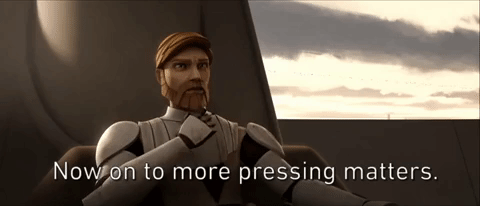Amping up your facilitation skills
Facilitation is part tactics, finesse, empathy, and adaptability…it is a powerful skill to hone and use like a Jedi!
To facilitate is to make something easier or easy. At work - you’re trying to guide the group as effortlessly as possible to the outcomes you want out of that meeting.
Facilitation is also multidisciplinary… a lot comes together to make it “easy”.
I have found it helpful to break it down into three areas:
Prep work (this will make your life IMMENSELY easier)
Do we need to even have this meeting? What’s the value of it? Can we solve the problem, make a decision, or discuss it via email, or IM? Time is too important to waste!
Know your audience
Who should be involved
What are the dynamics of the teams
What’s the outcome you want to achieve
How much does the team know about the topic(s)
Only invite contributors to the meeting. Those who want to “listen in” should focus on doing other work
Set the agenda including expected outcomes. This includes any format or workshop/meeting specifics you plan on having in the meeting (games, breakouts, case studies+++)
Send out pre-reads
Showtime!
Presenting and public speaking experience - Just do it at work. Also, look to join a group or community that allows you to present, moderate, and/or facilitate discussions
Active Listening - You need to be present (pay attention!) and focused on the conversation taking place, understand it, and capture the perspectives of those attending. A frequent challenge here is that people are not really listening but simply waiting out the individual speaking to then respond with their thoughts - don’t do it. If you find yourself heading that way, clear your mind. Lastly, record the session or take notes for the meeting. Few people can remember everything and it pays to have notes.
Questioning (dial-in your first principles thinking!) - Asking smart questions that prompt deeper thinking or clarification of a topic. Directing the conversation through questions can help with stalled/stale conversations and will keep the flow of it moving along.
Conflict Resolution - Your ability to keep the peace during conversations. Ensuring conversations are factual, positive, and conducive to the outcomes. If you find yourself in a situation look to understand each individual’s perspective and come to a level of agreement during the discussion. If the conversation starts to derail the meeting too much - ask to set up a separate conversation with those individuals ASAP and get to a resolution.
Empathy - you prepped before the meeting as well as now during the meeting you can see the actions and behaviors of individuals. You want a safe, inclusive, and productive conversation…keep the conversation professional and make sure you look to continuously understand the group through their queues in the meetings. This builds trust.
Adaptability and Flexibility - meetings often change course, and people will try to derail it with their agenda, tangents, OR on the positive side, exciting discoveries are identified and warrant pushing the existing topic(s) in favor of this discovery. Use your judgment here based on your knowledge of the program and situational awareness.
Time Management aka Flow - you have a timeframe, an outcome, an agenda and you need to get ideally get through all of it…effortlessly. Keep the group on point, move conversations along where it makes sense, and don’t be afraid to politely let someone know “we’re going to move on but that you will address whatever they’re talking about after the meeting”. This becomes a bit of a dance and art in some meetings; especially if you get long-winded individuals and overtly assertive executives. You want to be professional, tactful, courteous and yet maintain flow and control in the meeting.
Decision-making and Problem-solving - you’re meeting for a reason. Make sure the group isn’t just getting together to talk and then talk some more…UNLESS of course that was the point of the meeting and well then, carry on 😂. It would be best if you had concrete decisions and actions; make sure they happen. Gracefully guide the group in their discussion.
Neutrality can be a great tactic to maintain trust and credibility with participants, ensuring that the facilitation process is fair and unbiased. This isn’t always the case…again you have to know your audience and why you’re meeting to determine how to position yourself as a facilitator in the conversation.
Follow up
Send out a link for ALL of the materials - including summary, actions, and decisions
Feedback loops - most people forget at least 50% of what they hear in a meeting or workshop within the first 24 hours and it’s almost gone entirely after a few days. Clearly articulate how you will be communicating with the group
Further actions, deliverables, and decisions - make sure that single owners, statuses, and expected completion dates are assigned to whatever is required as an outcome of the meeting.
Overarching skills required to be a solid facilitator:
Building deep and trusted relations
Communicating with intent
Understanding of systems and frameworks for facilitation - agile, design thinking, ++++
Influential leadership - you need to be able to mobilize people and guide them towards the outcomes
Workshop Design
Much of what was said about being a solid facilitator also goes into how you design your workshops as well.
The additional areas that we can look at include:
Understand learning theories, instructional design models, and how to structure content for effective learning. This includes setting clear learning objectives, developing activities that reinforce the content (case studies, problem-solving exercises, collaborations, homework, additional content consumption), and creating content that supports different learning styles.
Get creative with how you deliver the workshops to make them more engaging, memorable, and effective. This can include using gamification (although this tends to end up being tacky), storytelling, or immersive experiences like AR.
Do you have a deep understanding of the subject matter for the workshop or do you need to bring in guest experts as well? Leave your ego at home and don’t be afraid to seek out help and additional expertise. It will bolster the experience of those in the workshop
Closing thought - not all skills/facets of what I have said above are mandatory or necessary for all meetings. Like any role, your greatness comes from better understanding the role through DOING IT. Experience, learn, grow, repeat.
Thanks for reading!
Let me know your thoughts in the comments.
-Adam




